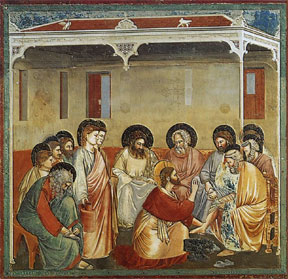On Friday I encouraged you to read Philippians 2:1-11 slowly and prayerfully. Today I’d like to highlight a few features of this astounding text.
If you’re in the middle of a conflict with other Christians, however, you might not like this passage very much. Your gut instinct is to win the battle, to be vindicated, to prevail over your opponents. But this text speaks of being agreeable, humble, and considering others as better than yourself. If you’re like me when I’m duking it out with my brothers and sisters in Christ, this is not what you want to hear. You’d probably prefer that I had sent you to Psalm 58:8, in which David prayed about his enemies: “Let them be like the snail that dissolves into slime.” But, like it or not, if you’re a follower of Christ, you’ve got to deal with Philippians 2:1-11. More to the point, you’re stuck with the compelling and challenging example of Jesus himself.
Philippians 2 begins with a series of ethical injunctions that could be paraphrased: agree with each other; love each other; be humble; care more for the concerns others than for your own concerns. These imperatives are summarized in verse five: “Let the same mind be in you that was in Christ Jesus.” In a nutshell, we are to think as Jesus thought.
Paul doesn’t leave it up to us to decide what it means to think like Jesus. We don’t get to pick and choose from the gospel stories or to make up our own version of what constitutes the mind of Christ. Rather, Paul shows us quite clearly in verses 6-8 what it means to think like Jesus:
[Christ Jesus], though he was in the form of God,
did not regard equality with God
as something to be exploited,
but emptied himself,
taking the form of a slave,
being born in human likeness.
And being found in human form,
he humbled himself
and became obedient to the point of death–
even death on a cross.
This is a tricky text for a variety of reasons. For one thing, the language is rather unusual for Paul and therefore difficult to interpret. This fact, combined with the poetic structure of the passage, has led many scholars to propose that Paul is quoting an early Christian hymn, something he did not write. This explains the uniqueness of the language. But it’s also possible that Paul composed this poetic text when writing to the Philippians. In either case, it’s not easy to determine the precise nuance of every word here, even though the big picture is fairly clear. (Photo: Ruins of the ancient forum in Philippi. Photo used by permission of HolyLandPhotos.org.)
 What is this big picture? It’s an image of Christ’s active humility. It’s a portrait of one who was fully equal to God the Father, but who, nevertheless, chose to take on the form of a slave by becoming human. Moreover, this passage paints a shocking picture of a divine being who not only became human, but also chose to die a most humiliating and painful death by crucifixion. One cannot imagine a more startling and unsettling image of humility and self-sacrifice.
What is this big picture? It’s an image of Christ’s active humility. It’s a portrait of one who was fully equal to God the Father, but who, nevertheless, chose to take on the form of a slave by becoming human. Moreover, this passage paints a shocking picture of a divine being who not only became human, but also chose to die a most humiliating and painful death by crucifixion. One cannot imagine a more startling and unsettling image of humility and self-sacrifice.
How might our conflict with others be different if we took seriously the humility of Jesus? How might we react to those who wrong us if we were to reflect upon the self-giving love of Christ? The beginning of Philippians 2 suggests that our relationships with others – including and especially when we’re experience differences and disagreements with them – would be radically different.
In tomorrow’s post I’ll continue to reflect upon Philippians 2 and its implications for our behavior when we’re experiencing conflict with other believers.

